An increase in global demand has seen the price of Australian beeswax skyrocket in recent years, with local beards and beekeepers among the victims.
Australia's honey bee industry remains the only one worldwide that does not have the destructive varroa mite, which has caused extensive colony losses in the US and Europe.
That means local apiarists do not need to use chemicals to deal with the parasitic pest, so their beeswax is pharmaceutical grade.
It is so sought after, particularly in Europe for cosmetics, that the price has climbed from around $5 per kilogram five years ago to $30.
One person who has noticed the price hike is Kirsty Hunter, co-founder of the Dead Man's Beard Company based at Warracknabeal in regional Victoria, which uses the wax in its beard and moustache styling products.
"It's definitely becoming incredibly expensive," she said.
"We've been established for two years now and the price has almost doubled."
Currently the company is absorbing the extra cost by making savings elsewhere, but Ms Hunter said she fears it will eventually have to pass on the higher prices to customers.
"Men's grooming products are one of the first things that men will cut back on," she said.
Beekeepers getting raw end of wax price hike

(ABC Rural: Renee Cluff)
Another industry struggling to afford the increased cost is, ironically, the same industry that produces the beeswax.
While some beekeepers have been able to take advantage of the higher prices, many others, particularly those affected by drought, have suffered.

(ABC Rural: Renee Cluff)
Beekeepers use wax for new honeycomb foundations.
It is a form of recycling, in which the wax bees produce is melted down and made into indented sheets, which are inserted into new hives.
Cairns beekeeper Maurie Damon is having trouble sourcing the beeswax needed to increase his production.
He said suppliers are prioritising exports to take advantage of premium profits.
"The price was around about $4.50 to $5/kg and now you're looking at $20/kg, but it's very difficult to get hold of it," he said.
Beauty and health industries drive price
Beeswax can be used to make a range of products including candles, cleaning agents, food glazes and lubricants.
According to business reporting provider Transparency Market Research, cosmetics and pharmaceutical applications are the two major growth areas as consumers worldwide seek all-natural and healthy options.
Trevor Weatherhead, the executive director of the Australian Honey Bee Industry Council, said it is those products that are driving the global demand.
"There is a thing called the British Pharmacopoeia standard and Australia can certainly meet that, where a lot of the European countries can't because of the treatment for the varroa mite."
Are there alternatives?
In the beekeeping industry, plastic honeycomb foundations are available as an alternative to wax and are cheaper but still need a wax coating to encourage bees to use them.
Imported wax is another option, but new research by the Australian Honey Bee Industry Council has discovered such products can be fake and pose a biosecurity risk.

(ABC Rural: Renee Cluff)
"So we've been onto the Australian Government and we're trying to make sure any beeswax coming into Australia gets inspected because if we get those insecticide residues into our Australian honey then we'll lose that premium reputation."
For beard tamer Kirsty Hunter, there is nothing that compares to Australian beeswax.
"We don't want to take any backward steps in the quality of the product.
"So if the price of Aussie beeswax continues to climb we're going to have to look at increasing our pricing."
By Renee Cluff
Posted 30 May 2018, 8:41am




